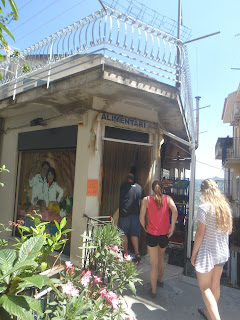Notes from the Field School: July 28th, 2016
 |
| Karl speaks to students about his work in South America. |
Students gathered this morning to further discuss sex and age determination in mummies as well as to expand on the discussion of archaeoparasitology. Karl regaled students with stories of his experiences working in South America early in his career. He introduced students to the Chinchorro mummies of the Atacama Desert. They learned about the unique mortuary practices of this ancient culture and discussed later South American cultures, like the Chiribaya. The conversation even turned to the parasites recovered from the dog mummies recovered from Chiribaya sites.
 |
| Students check out a local grocery store. |
The class was dismissed early before lunch and many of the students decided to walk to a small nearby grocery store. The store sells fresh fruits and vegetables, dry pastas, tasty snacks and candies, and a wide range of other local products. Everyone gathered shortly thereafter for a delicious lunch of salad, fresh mozzarella, ham, bread, eggs, and nectarines. Following lunch, Karl used his new skills in speaking Italian to talk with the cook about how much we've all liked the food and what kinds of things we would like to try over the next week.
 |
| Whipworm egg recovered from Piraino 1. |
The class reconvened in the afternoon for more discussions of parasites and the importance of quantification in archaeoparasitology. Karl gave the students additional examples of parasite studies from South America, colonial era USA, and Europe. He covered the methods used by professionals for quantifying parasitological data and led a discussion of parasitological trends in public health of past populations.
Karl then turned to his work in Europe. He discussed his work with the
Piraino 1 mummy, which was discovered to have a heavy whipworm infection. The students were excited to learn about a mummy that they will be meeting in a few days. I supplemented Karl's lectures with my work in European sites. First, I talked with the students about the work in Lithuania, where we encountered a taphonomic issue that only occurs when working with parasites from mummies. Then, I presented our lab's work on coprolites found in context with skeletons in Nivelles, Belgium. Karl ended the day with a presentation about a case of megacolon from a Texas mummy that was infected with Chagas' disease.
Dinner was amazing, as always! Tonight, we were treated to a delicious risotto with mushrooms and prosciutto served alongside mozzarella bread, nectarines, and stuffed eggplant. Salami and cheese were also passed around the table. We had the tiramisu-flavored almond candies for dessert. Everything was delicious and we all walked away leaving behind cleaned plates.
 |
| Mozzarella cheese bread, stuffed eggplant, and risotto with prosciutto and mushrooms. Mmmmmm! |
Written by Dr. Johnica J. Morrow (University of Nebraska-Lincoln)



